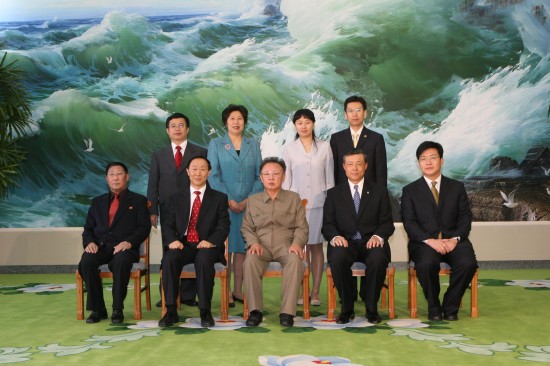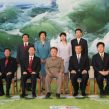
Wang Jiarui’s New Year’s Visit to Pyongyang and China’s New Approach to North Korea
Publication: China Brief Volume: 9 Issue: 4
By:

Chief of the International Liaison Department of the Chinese Communist Party (CCP) Wang Jiarui visited Pyongyang on January 21-23, the eve of the Lunar New Year holiday, to mark the beginning of the "Year of China-DPRK Friendship" (Xinhua News Agency, January 23; Korean Central News Agency [North Korea], January 23). Wang’s visit and meeting with North Korea’s (DPRK) Kim Jong-Il (Wang’s fourth meeting with Kim Jong-Il in the past five years), marked "The Dear Leader’s" first public appearance with an international visitor since he was rumored to have had a stroke, back in August of 2008. It also marked the continuation of an effort by Beijing to stabilize and sustain direct ties with Kim Jong-Il following a hiatus in high-level contacts in the year following North Korea’s test of a nuclear device in October of 2006.
Kim Jong-Il used the occasion of Wang’s visit to project an image to the world that he has fully recovered from his rumored health problems. Following a DPRK New Year’s editorial that notably refrained from criticism of the United States (Korean Central Broadcasting Station, January 1), Kim’s appearance before an international audience demonstrated to the newly-inaugurated Obama administration that Kim is in charge and fully capable—possibly even eager—of meeting with a high-level envoy, should the U.S. president choose to send one to Pyongyang. In the weeks following Wang’s visit, the DPRK made an unusual public announcement that China had agreed to provide additional economic assistance to the DPRK, which may have been intended to promote perceptions in South Korea that China is becoming overly influential in the North and that Pyongyang’s over-reliance on China should be countered by the resumption of South Korean aid (Yonhap News Agency, February 5).
Equally important, Wang’s visit served China’s interests by providing the People’s Republic of China (PRC) an opportunity to assess Kim’s condition and gauge his willingness to adhere to prior pledges to denuclearize. Wang secured a reaffirmation of Kim’s pledge: “The North Korean side will commit itself to the denuclearization of the Korean peninsula, and hopes to co-exist peacefully with other involved parties” (Yonhap News Agency, January 23).
During the visit, Wang presented Kim Jong-Il with a letter from Chinese President Hu Jintao and Kim accepted an invitation to visit China at an unspecified time (Xinhua Domestic Service, January 23). If realized, it would mark the first exchange of leadership visits between China and the DPRK since Kim’s visit to China in January 2006, following Hu’s visit to Pyongyang in October of 2005. Such an exchange could be the centerpiece of planned activities that mark the “Year of China-DPRK friendship” in 2009.
Wang’s visit signals that the internal Chinese policy debate over the strategic value of relations with the existing DPRK regime has been settled for now and reaffirms the interdependence of strategic interests underlying the Sino-DPRK relationship: in other words, the PRC seeks stability on the Korean peninsula while the DPRK remains dependent on China for critical food and energy supplies.
China maintains closer high-level ties with Pyongyang than any other country, enhancing China’s value as a potential partner and intermediary in managing the North Korean nuclear issue together with the United States. The visit also sends the signal that if the United States were to seek a rapid improvement in bilateral ties with North Korea, China is well positioned to protect its interests and maintain its influence on the peninsula, a not-so-subtle suggestion that stability on the Korean peninsula will not be possible unless China’s interests are taken into account.
Post-Nuclear Fallout
North Korea’s nuclear test was a major blow to Chinese attempts to utilize its economic support to constrain North Korean actions. Uncharacteristically, in the run-up to both North Korea’s July 2006 missile tests and October 2006 nuclear test, Chinese senior officials issued public warnings not to conduct such tests. North Korea’s nuclear defiance challenged international norms, but more importantly the test was perceived by China’s top leaders as a direct act of defiance.
Beijing’s indignation quickly became evident in China’s strong official statement, which charged: “the DPRK ignored universal opposition of the international community and flagrantly conducted the nuclear test” (Xinhua News Agency, October 9, 2006), in addition to its unprecedented willingness to sign onto a UN Resolution imposing international economic sanctions on trading of military and nuclear items as well as luxury goods. UNSC Resolution 1718 passed only five days after the October 9, 2006 nuclear test with unprecedented Chinese support.
Following North Korea’s nuclear test, an intense debate ensued in response to a series of questions from China’s small community of experts on North Korea, including the strategic value of the DPRK to China; whether North Korea would eventually give up its nuclear weapons; whether the Sino-DPRK treaty should be revised, abandoned, reinterpreted, or remain unchanged; and the likelihood of a rapid improvement in U.S.-DPRK relations and how such a development would affect Chinese interests [1].
Following the North Korean nuclear test, the recovery of high-level ties in the Sino-DPRK relationship have shadowed progress in the Six-Party Talks, with improvements of the bilateral relationship occurring in tandem with progress in the talks during 2007. One month following the conclusion of the February 13, 2007 implementing agreement among the six parties, Kim Jong-Il visited the PRC Embassy in Pyongyang for the first time in six years in a gesture that somewhat thawed the ice in Sino-DPRK relations. Politburo member Liu Yunshan visited Pyongyang and met with Kim Jong-Il in October of 2007, following the announcement of a six-party agreement outlining second-phase actions for implementation of the September 2005 Six-Party Joint Statement, which focused on North Korea’s declaration of its nuclear activities. Regular top-level contacts with North Korea resumed in 2008 with Wang Jiarui’s visit in February of that year and Hu Jintao’s heir apparent Vice-President Xi Jinping’s visit to Pyongyang the following June, which was only a month prior to Kim’s alleged illness. Despite this flurry of exchanges, however, it appears that the level of Sino-DPRK ties has not recovered to those which existed prior to the October 2006 nuclear test.
New Thinking About Chinese Leverage
Among the outcomes of this debate was a decision to modify China’s practice of relying almost exclusively on positive incentives to influence North Korean policies and behavior. Beijing’s recognition that a policy combining carrots and sticks is necessary was suggested by a Chinese official who commented privately: “If we merely rely on pressure, then it won’t work. In the new situation after the test, if we only promote dialogue, that also won’t work. Both should be pursued in parallel. The two wheels must work together. Only if they are working simultaneously can they be effective” [2].
Chinese researchers note that China’s new approach to using its leverage over North Korea to influence its policy choices includes the following: 1) private persuasion that is clearer and more pointed than in the past; 2) constant reminders that denuclearization of the Korean peninsula is vital to Chinese security and is a priority in the bilateral relationship; 3) harsh public denunciation of provocative North Korean actions that are deemed by China as destabilizing; 4) use of new tools, such as tightening up export controls to prevent further progress in North Korea’s nuclear programs and 5) the imposition of sanctions to alert North Korea of China’s opposition to its actions in extreme cases.
The utilization of pressure by China on North Korea is likely to be constrained, however, by two major Chinese concerns: 1) Beijing worries that pressure could induce instability in North Korea, which would be detrimental to Chinese interests; and 2) also fears that it could result in diminished Chinese influence and even in North Korea adopting a hostile policy toward Beijing.
Should North Korea proceed to conduct a test of its long-range Taepodong-2 missile in the near term, as South Korean officials claim it is preparing to do, China can be expected to use a variety of carrots and sticks to mitigate the crisis and ensure that North Korea remains on the path toward denuclearization. If Kim Jong-Il breaks his pledge to denuclearize and insists on being a permanent nuclear state, China may conclude that North Korea is a strategic liability and perhaps be willing to cooperate with other nations to impose much harsher sanctions. As one influential Chinese scholar noted, China’s message to its treaty ally in supporting limited sanctions after the October nuclear test was clear: “If you possess nuclear weapons, this will be harmful to the bilateral relationship. If you become a permanent nuclear weapons state, there will be permanent damage to the relationship” [3].
Notes
1. Bonnie Glaser, Scott Snyder, and John Park, “Keeping an Eye on an Unruly Neighbor: Chinese Views of Economic Reform and Stability in North Korea,” U.S. Institute of Peace Working Paper, January 3, 1008. Accessed at
https://www.usip.org/pubs/working_papers/wp6_china_northkorea.pdf.
2. Chinese official, conversation with visiting delegation of U.S. experts in Beijing, June 2007.
3. Senior Chinese think-tank scholar, conversation with visiting delegation of U.S. experts, November 2008.





